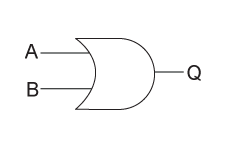So I alluded to this in my About page and figured I would start there. <sarcasm> No better way to start a blog than on a light topic right? </sarcasm> (As a foreigner living in the UK I just want to be fair to everyone, so I’m being explicit - the bane of being a programmer.) So lets dig right in, what is this confusion I am even hoping to discuss?
Starting from the top… OR, the common logical expression, gives a true output when at least one of its inputs is true, otherwise it is false. (In hardware true is equivalent to a voltage being applied or 1, and false is being grounded or 0) This seems pretty straight forward right, how could this ever confuse me? Well, with a background in hardware I can explain this in language I am familiar with. It depends on whether you evaluate an expression sequentially or combinatorially (hint: JavaScript is sequential, physical logic gates are combinatorial). What does this mean? Let me illustrate.
Starting with sequential, this means statements are evaluated in a known, specified order. In JavaScript, the expression below is completely valid. If variable is undefined the second half of that OR statement should throw an error, since you can’t perform an operation on a non-existent variable. So why doesn’t it? This is because it evaluates the first test first, and if it returns true the latter is never evaluated, as it knows the whole statement now has to be true. This means we are totally in the clear and we never try to do an operation on a variable that doesn’t exist. Up until now, I would never have written a statement like this. To me, it just looked wrong. Combinatorial logic explains this.
if( variable === undefined || variable === 0 ) {...In combinatorial logic, things are evaluated in parallel, with no particular order. Take a physical OR gate, as illustrated below. It has two inputs, A and B, and one output Q. This gate evaluates in real time. Just because you put an undefined signal (in the case of hardware this would mean it was neither 1 or 0, very possible by just leaving the input disconnected) into A, this does not stop the gate from considering B. Just for completeness, this means that the output would also not be concretely defined as 1 or 0.

So with combinatorial logic, the JavaScript above would not have been valid because the second evaluation is impossible. The intended functionality would have been achieved using a nested if, luckily this is not necessary.
if( variable === undefined ) {
if( variable === 0 ) {...It is obvious that a given paradigm changes the way someone sees the world or simply approaches a problem, but what this shows is that ‘technical’ is not a paradigm, there’s more to it than that. Many may say this is obvious, but for me it was the first time that I saw that my hardware background did have an effect on the way I write software (it isn’t the last time either, more of that looking forward). You just can’t write JavaScript with the same mindset, you would System Verilog! This shows that logic is not just logic, it too is tainted by perspective. Oh just think of the potential implications outside of engineering, how many intense debates could be had, but that really is a discussion for another time!